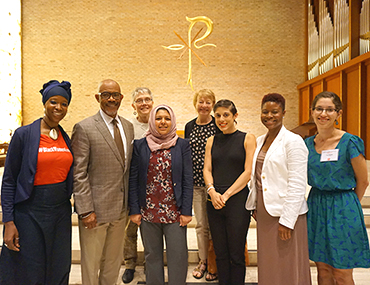On July 14, Bank Street welcomed dozens of educators, administrators, leaders, and community stakeholders in a daylong exploration of issues at the forefront of educational policy today. The event, which included a panel discussion followed by small-group breakout sessions, created the space for like-minded individuals to connect with one another about the best ways to cultivate social justice and equity in schools.

The morning’s panel brought together six passionate individuals who have worked closely around specific policy issues through activism, advocacy, and public service: Dr. Lester Young, Jr., Member-at-Large at the New York State Department of Education, Regent; Zakiyah Ansari, Advocacy Director of Alliance for Quality Education (AQE); Sarah Camiscoli, Co-Founder, and Co-Director of IntegrateNYC4Me; Ayisha Irfan, Policy Analyst for the Office of Manhattan Borough President Gale A. Brewer; and Carol Burris, Executive Director of the Network for Public Education Foundation.
During the panel, participants each had the opportunity to respond to the central question: How can an educator be an advocate around issues of policy while working in the field? Panelists shared different perspectives that conveyed a deep sense of urgency to reclaim schools and communities as safe and supportive spaces that nourish the tenets of democracy.
“I believe there is no more important thing for the nation, the state, the city, or any community than to ensure that all young people go as far as their hopes, dreams, and hard work will take them,” said Dr. Young. “Right now, what our school systems face nationally and locally is an inequitable distribution of talent. The communities that need great teachers are the communities that find it hardest to attract those teachers.”
Drawing on their own experience and expertise in the field, panelists touched on a range of topics including inequitable distribution of talent in schools, shifting power dynamics, resource allocation in underfunded or failing schools, and the need for democratic control of public schools, among others. They delivered their remarks with energy, enthusiasm, and optimism.
“If we’re ever going to have an impact on policy and shift these power dynamics that are so entrenched in race and class and segregation and resources and equity, we have to change our concept of what policy is,” said Camiscoli. “A policy is just the way something is organized and something operates. As parents, as school administrators, as teachers, etc., you are a conduit to change policies.”
Breakout session topics included assessment and evaluation, charter schools, special education, immigration, budget and funding, the Equity and Excellence for All policy, school desegregation, and state and federal level policy, which drew the participation of New York State Senator Velmanette Montgomery. In one of the sessions, participants agreed to start an email group as a platform for exchanging resources, sharing best practices, and exploring ways to build school and family partnerships.
“The event opened up the space and time for practitioners and other professionals to come together to think, network, and formulate plans for collective action,” said Wendi Williams, Associate Dean of the Bank Street Graduate School of Education. “Through the summit, we hoped to refresh and reinvigorate the conversation around educational policy and we look forward to continuing our work to effect meaningful change that leads to the types of schools all children deserve.”